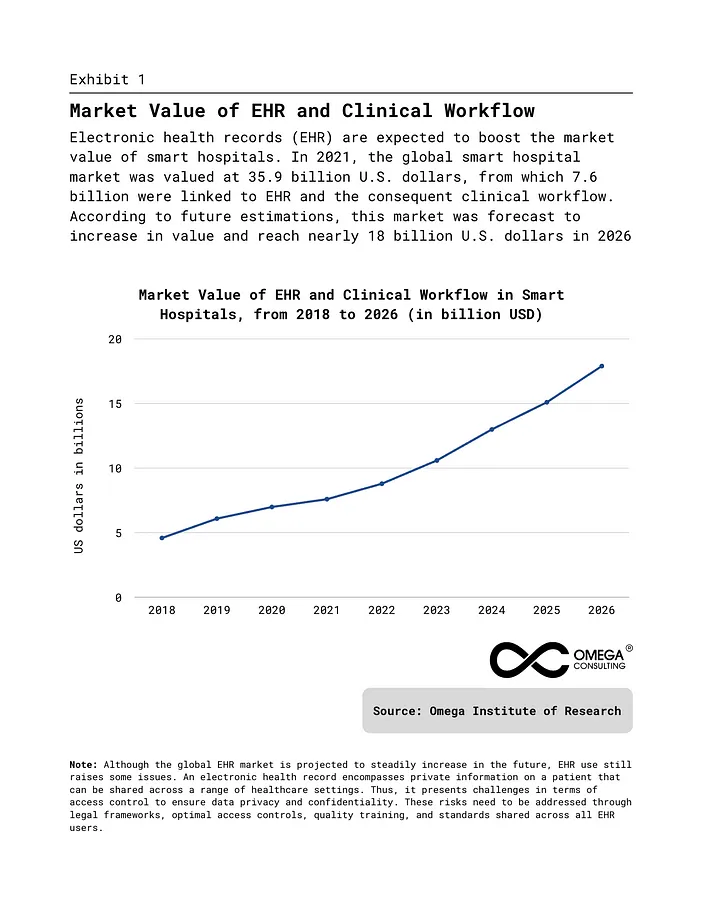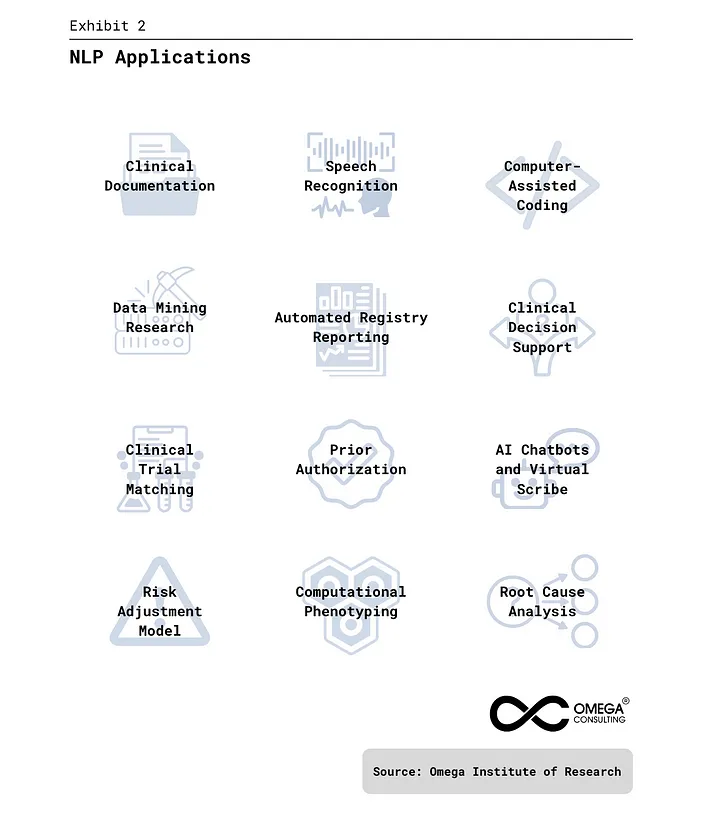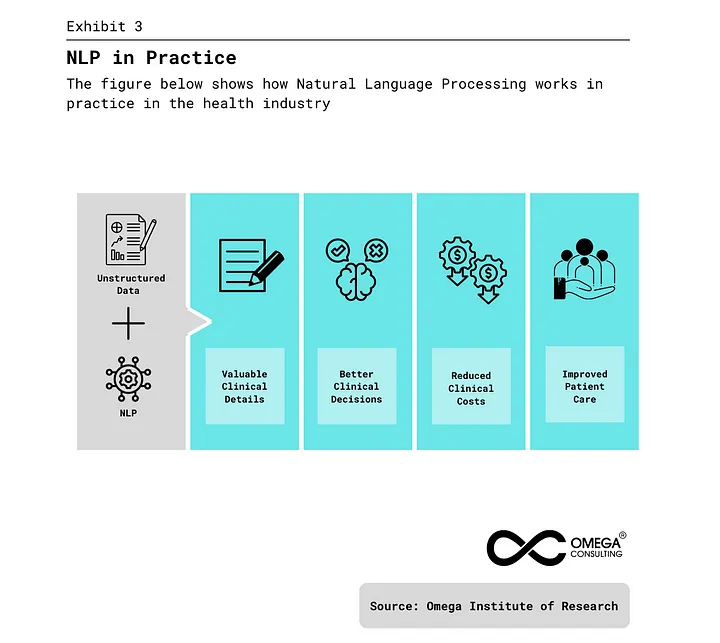- Industries
Industries
- Functions
Functions
- Insights
Insights
- Careers
Careers
- About Us
- Healthcare
- By Omega Team

Artificial intelligence (AI) and machine learning are already transforming medicine in amazing ways — and the era of AI-based healthcare applications is just beginning.
The growth of AI-based tools for medicine goes hand-in-hand with an explosion in medical data. Researchers and clinicians now have access to huge volumes of data from Electronic Healthcare Records (EHRs), sophisticated sensors and imaging tools, genomic analysis and a multitude of other sources. The volume of available data goes far beyond the ability of humans to process and utilize. However, sophisticated AI tools, including machine learning and predictive algorithms, can help people draw meaning from this deluge of data and see patterns that can be used to make better choices for patients.
NLP Applications
Natural language processing (NLP) refers to the branch of computer science concerned with giving computers the ability to understand text and spoken words in much the same way human beings can.
NLP combines computational linguistics — rule-based modeling of human language — with statistical, machine learning, and deep learning models. Together, these technologies enable computers to process human language in the form of text or voice data and to ‘understand’ its full meaning, complete with the speaker or writer’s intent and sentiment. NLP technology is already available. We can see it in many homes worldwide in the form of smart speakers or customer service chatbots — although the technology used in healthcare is somewhat more complex.
NLP in healthcare provides value. It has been reported by ForeSee Medical that up to 80 percent of the data obtained via electronic records and other IT systems is unstructured. The time and money that can be saved by employing this AI technology is enormous, enabling healthcare providers to then re-focus on patients.
NLP has the potential to scan clinical documents in a matter of moments and isolate the crucial components. Furthermore, the integration of NLP into everyday health matters can help combat the problem of burnout among health professionals. With the technology undertaking the analysis of health records, the large burden will be removed from the shoulders of the workers.

Improvement Methods
A distinct advantage natural language processing medical records offers is the ability for computer assisted coding to synthesize the content of long chart notes into just the important points. This could take organizations weeks, months, even years, to manually review and process stacks of chart notes from health records, just to identify the pertinent info. NLP software for healthcare can scan clinical text within seconds and identify what needs to be extracted. This frees up physicians and staff resources to focus more on the complex matters and reduces the time spent on redundant administrative policy. When computers can understand physician notation accurately and process that data accordingly, valuable decision support can be obtained. These insights can be of significant use for future drug research and personalized medicine, which is good for patients and providers.
In 2018 and 2019 the development to improve natural language processing healthcare data has proven challenging. Physicians don’t all speak the same way, and should always be aware that their notes and reports will likely be read by their work peers, patients and even computers, according to their organizations privacy policy. Avoiding non-standard language in note creation and management is extremely important. Most NLP healthcare engines are built to accommodate a wide variation of medical notation terminology. However, using uncommon acronyms can confuse coding algorithms and other medical note readers.
There are several ways in which AI can be leveraged to improve NLP in healthcare. For example, machine learning can be used to develop algorithms that can automatically identify and classify medical entities such as diseases, symptoms, and medications. This can help to speed up the process of data analysis and make it more accurate.Also, AI can be used to develop chatbots and other digital assistants that can help patients to access information and services more easily. These tools can also be used to provide support and guidance to healthcare professionals, helping them to make better decisions about patient care.


Overall, AI-powered NLP is a powerful tool that can be used to improve the efficiency and effectiveness of healthcare data analysis. By harnessing the power of AI, healthcare organizations can gain a greater understanding of their data and use it to improve patient care.
Key Benefits
By examining natural language processing use cases in healthcare, there are 3 basic issues NLP can solve for the healthcare industry:
- Improving clinical documentation: The poor electronic health record is a problem area for the healthcare industry. Data integration, reception distribution, and funding: metrics are stumbling blocks for hospital interoperability. According to 56% of healthcare leaders, managing this information is a key obstacle to improving interoperability.
- Supporting clinical decisions: applying NLP to healthcare is one of the basic steps to simplify making clinical decisions. Any doctor or physician would say that lack of information harms diagnosis and treatment. Currently, 66% of unstructured data is not available for patient care decisions.
- Information extraction: The huge volume of unstructured patient data that is put into EHRs provides a challenge for any single physician to analyze and get a comprehensive view of the patient history. By using information extraction techniques in NLP in the medical field, we can provide a comprehensive, accessible, and accurate history of the patient to the physician.
Future Outlook
Natural Language Processing has found applications in healthcare ranging from the most cutting-edge solutions in precision medicine applications to the simple job of coding a claim for reimbursement or billing. The technology has far and wide implications on the healthcare industry, should it be brought to fruition. However, the key to the success of introducing this technology will be to develop algorithms that are intelligent, accurate, and specific to ground-level issues in the industry. NLP will have to meet two goals: data extraction and data presentation. Only after this patients can have an accurate record of their health in terms they can understand. If that happens, there are no bars to the improvement in physical efficiency we will witness within the healthcare space.
Subscribe
Select topics and stay current with our latest insights
- Functions